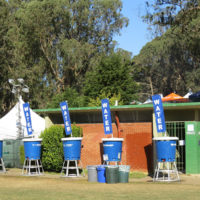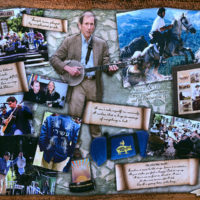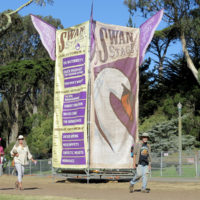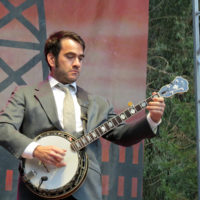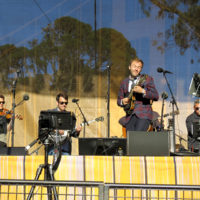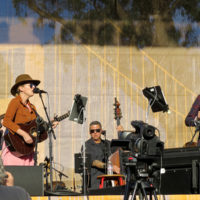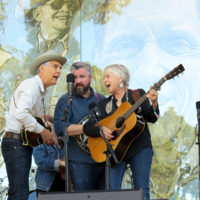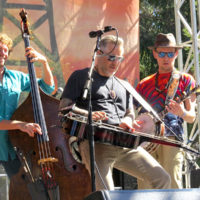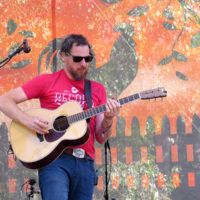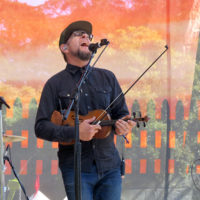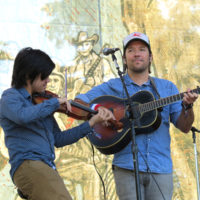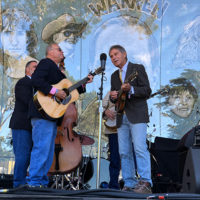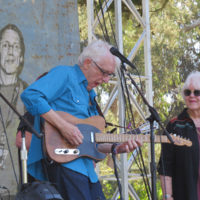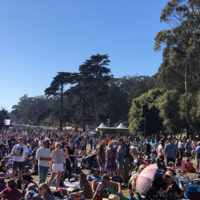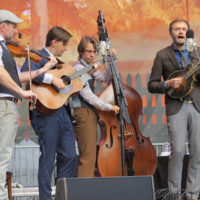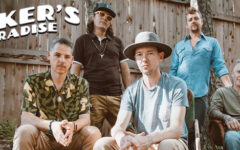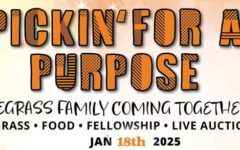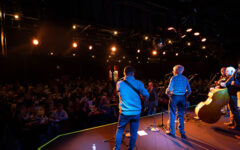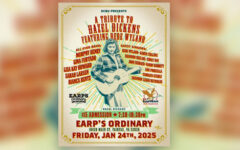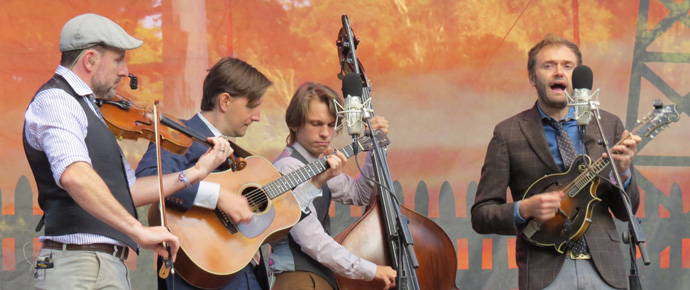
Punch Brothers at the 2019 Hardly Strictly Bluegrass festival in San Francisco
This weekend, the San Francisco Bay Area was treated to the nineteenth annual Hardly Strictly Bluegrass festival (HSBG), and although security rules changed things some, it is still one hundred percent free, and features an amazing volume and variety of country and roots artists across five stages. The new rules, enacted primarily for crowd safety, were taken in stride and had the additional benefit of reducing the sometimes overly exuberant party atmosphere and rowdiness occasionally seen in previous years. At the end of the day, it’s a good bet that HSBG founder and sponsor, the late Warren Hellman, would have given the changes a big thumbs up.
Longtime Bay Area bluegrass fans note that since a lot of the old guard first-generation bluegrass regulars like Earl Scruggs, Hazel Dickens, Ralph Stanley, and Doc Watson have passed on, they have not necessarily been replaced with traditional artists, especially at their beloved banjo stage. As a traditional bluegrass fan, I certainly understand that frustration, but the lineup speaks loads to the variety and diversity of roots music where bluegrass bands such as Laurie Lewis, Dry Branch Fire Squad play alongside more progressive artists like the Punch Brothers, Sierra Hull, Mandolin Orange, Rob Ickes & Trey Hensley, Hot Buttered Rum, Poor Man’s Whiskey, and the Infamous String Dusters. Throw in Judy Collins, Bill Kirchen, Bettye Lavette, the Kronos Quartet, Buddy Miller, the Flatlanders, Mary Gauthier, Black Joe Lewis, Robert Plant, Shooter Jennings, and of course perennial favorites, Steve Earle and Emmylou Harris, and it starts to look like a live concert version of the recent Ken Burns Country Music documentary on PBS.
Speaking of variety, one of the many highlights was Friday at the Towers of Gold Stage, where fans were treated to the entire rehearsal, run-through, and live recording for the NPR show, Live from Here with Chris Thile. Special guests were Grace Potter and a young Kenyan folk singer, J.S. Ondara. The stellar backing band including Aoife O’Donovan, Noam Pikelny, Chris Eldridge, Alex Hargreaves, and Mike Elizondo are at ease accompanying artists of any style. Anyone who has seen Chris live knows his energy is front and center, and its fun seeing him use that to construct a wonderfully collaborative experience much as one might imagine the old-time radio shows were.
Thanks to talent buyer, Chris Porter, who took time from his busy schedule to talk about the second year of curating this huge event.
Hi Chris. This is your second year doing HSBG. What did you learn last year that made this year easier and hopefully better?
I think every year working on a festival is a learning experience that will inform plans for the following years. Last year being my first time working on HSBG, I made a point to carefully observe the operations and production of each stage, as well as the overall operations and aesthetics of the grounds. Because of that, I have a deeper understanding of why we prepare the event in certain ways and why some acts work well on a particular stage and perhaps not so much at another one. Every aspect of a festival or large event is interconnected to some degree. I now have a clearer vision of the event moving forward which should continue and evolve.
I read that previous to joining the HSBG team, you had only attended one time previously. Did that event prepare you for this undertaking?
Yes, it certainly did. There’s a certain vibe to HSBG that’s arguably like no other. I felt it back then as I do now working on it. Being there as an attendee allowed me to see it from that point of view which I think is very important for future programming visions.
It’s really hard for the layman to conceive the enormity of this task. You have tons of experience at this so how do you keep it from being overwhelming?
I’ve had a lot of practice! I booked festivals for close to twenty years before working on HSBG. I have an enormous love of doing that. To me, it’s my art. So if you love a project deeply and have been through the drill enough times, it gradually feels less and less overwhelming.
Have you been able to utilize Dawn Holiday at all in this mission?
Dawn has been very kind to be available to me if and when I have any questions she can answer, or I need any advice from her.
Has there been any thought to including more traditional bluegrass and old-time acts?
Bluegrass will of course always have a significant place at HSBG. The amount of it presented can vary from year to year depending on particular act availability, and balancing our wish to present other musical genres along with bluegrass.
What is the most interesting or unusual artist interaction that you can share with the readers?
I’m fortunate to have so many great interactions with artists over the years that it’s hard to point to one that was particularly unusual or interesting. But last year a particularly special interaction for me was with famed producer and musician, Don Was, who put together his band especially for HSBG last year. He was thrilled to perform his special presentation which focused somewhat on music from his old band Was/Not Was, as well as having guests like Bob Weir and Terence Blanchard join him. He’s a very approachable guy and after we had a nice introductory chat he thanked me and gave me a big hug. It meant a lot to me.
What bands are high on your list for the future?
That’s a secret. 🙂 but stay tuned! Hopefully, you’ll eventually see all of my high list wishes in the coming years.
HSBG has an interesting and creative lineup announcement process. Do you get involved in that and how does that impact you?
The announcement phase is a team effort, and somewhat of a tradition for HSBG. It doesn’t impact my programming, but I do have a say in who is included in the preliminary announcements.
You have worked a lot in the Boston and Seattle areas. What is different about gathering artists for an event in San Francisco?
I’m very fortunate to have worked in those cities because all three care deeply about the arts. The citizens are generally interested in all forms of music, and an enormous amount of people are interested in discovering music. So while San Francisco certainly has its own vibe and distinctive community, I feel a great overlap in attitude and general openness in those places. The main difference is that each has its own unique landscapes. So the places you can present festivals and special events will have different sets of qualities and challenges depending on a city’s infrastructure and spaces.
Notes
Videos for most of the shows can be viewed at the Hardly Strictly Bluegrass Webcast Archive. Photography by Dave Berry and Mary Ann Goldstein.

